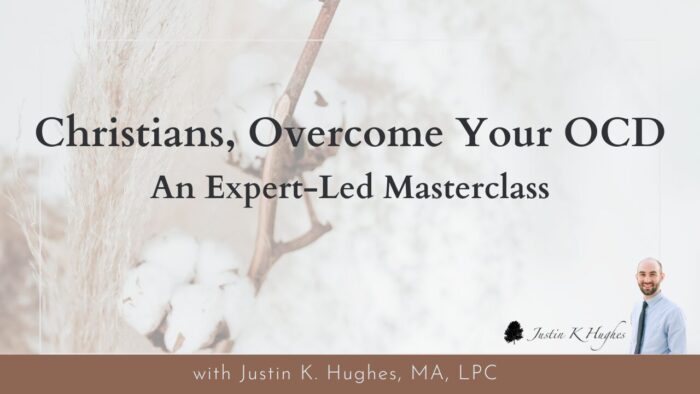
An enduring reality of life: we all have to do things we don’t want or like.
An enduring principle of life: discipline builds strength and character.
A curious paradox of life: doing disciplined things we don’t like often leads to greater contentment.
An enduring joy of life: experiencing discipline and seeing it pay dividends brings much satisfaction.
Charlie—He’s Just Like Me
I like working with clients, in part, because of how much I learn. When I open my eyes and humble my heart, I discover human traits I can connect to in every client who comes into my office. Take Charlie*. I admired him from the start of our work together. Kind, sensitive, and successful in life, few knew of how much he suffered internally. Once he came into therapy with me, he was desperate to not feel so anxious and overwhelmed. He specifically suffered with Panic Disorder, where repeated panic attacks leave people feeling traumatized and helpless. They really are one of the most terrible, acute human experiences.
Charles came to therapy “ready for anything you suggest,” but as most experienced clinicians know, the proving grounds of this are yet to be determined. The most motivated, cooperative clients often will “hit a wall” in their willingness when faced with challenging tasks—Charles wanted the end result of facing his panic disorder, which meant getting out and living life the way everyone without the condition is able to. After a few sessions in, he stopped doing his homework. He started to say things like, “I’m sorry, I just got busy,” and “I didn’t really want to do those exercises because they seemed a little awkward this week.” This is from the man who said he was desperate and would do anything!
How common this is to human nature. This is me, too. I get it—I really do. There are lots of things I say I want to do, but when it comes to game-time, I don’t show up the way I thought I would.
The Exposure Therapy Conundrum
For very few of us is the step entailed in a discipline the actual goal. I have known precious few people who actually, really, genuinely like every part of working out—as in, the sweating and grunting and discomfort and trembling of muscles and (good pain) during a workout, they love it. It’s hard for me to believe, but there are some who are like this. However, at some level, there is discipline none of us like. Most of us would skip a workout if we could get the results, feel great, and be healthy. Very few people would still be exercising if there weren’t other essential reasons that require it (endurance, heart health, flexibility, keeping up with one’s children, sexual health).
Enter exposure therapy. By definition, exposure is the systematic confrontation of something distressing (e.g., fear) while eliminating responses that seek relief at the moment (e.g., compulsions, safety behaviors). Most of the time, people don’t take pleasure in this. It’s distressing. They’d rather be anywhere else.
Thus, it is common in therapy to hear hesitations, concerns, doubts, and secondary reasons to not do exposure. Let this be just one place that tells you how it is:
In exposure, you will need to do things that aren’t direct goals. In fact, at the moment, they feel counter to direct goals.
Example: Charlie felt panic symptoms arise anytime he was in a large open field. Part of his exposure was to do exactly that—go to large open fields and confront the fear of doing so. He thought this was ridiculous; I think I can summarize his thoughts as thus: “So you just want me to drive to some open field in the middle of nowhere and go stand out there like a dummy?!” Yes. That’s what the treatment plan indicated. I get it- he wanted to confront the situations that were more “real to life,” such as that time he was driving to Austin and got a panic attack when he was 40 miles away from the nearest gas station. He expected that therapy would give him some trick or hack that would make him immune to this. Unfortunately, it doesn’t usually work this way.
In exposure therapy, here’s a common “sticking point” in a flow chart:
Most important tasks = too challenging to do without a safety behavior/compulsion.
↓
Less important tasks = less appealing, “awkward,” and different from their overall goals
↓
Clients attempt exposures too difficult for them
↓
Overwhelmed, burnt out, discouraged, or “proof” exposures don’t work
The Sticking Point
All of us dislike the pain that we feel when we’re pressed in an uncomfortable way. But we can’t rush learning. Here are a couple of cautions against rushing in exposure:
- Until you are able to successfully do something that elicits distress without safety behaviors, you won’t be ready for “game-time” level consistency.
- If you are seeking for the total absence of uncomfortable feelings, you’re setting yourself up for failure, even in full recovery.
- If you rush into something you’re not ready or able to do with consistency, you’re more likely to burn out.
Clients often try to find “secondary reasons” to avoid exposure, but as long as they do they will still be responding in fear rather than learning whether they can be free. Many of these reasons ultimately are at times excuses (i.e., “it wasn’t a good time,” “I’m not sure I really want to do that one,” “that exposure is not something a “normal” person would do, so I’m not sure I want to either”). Don’t short-circuit the necessary work!
Some Solutions
Not intended to be a cure-all, here are some quick ideas for effective exposure. First, did you know I have a FREE e-book guide for subscribers?
You can read more about these effective exposure tips, particularly for OCD, by going to the blog article:
- Stick to the plan your specialized therapist has. Intentionally discuss any challenges you have assertively.
- Collaboratively identify exposures that fit your big values and you’re willing to do, but also make room for things that you don’t want to do in the moment but still fit your values.
- Work on willingness for exposures you don’t want to do.
- Do some work on building your “buy-in” and motivation. Some common therapy help:
-
- Acceptance and Commitment Therapy (ACT)
- Motivational Interviewing (MI)
- Assess, assess, assess.
- When in doubt, bring it up to a member of your treatment team.
Charlie is a shining light to the OCD community. But he didn’t get there overnight. I always appreciate the sacrifice of clients—as I know how uncomfortable it is to learn discipline in things I’m not yet good at. Yet it’s necessary and yields incredible fruits for those who are willing to do the work of planting the tree.








Leave a Reply